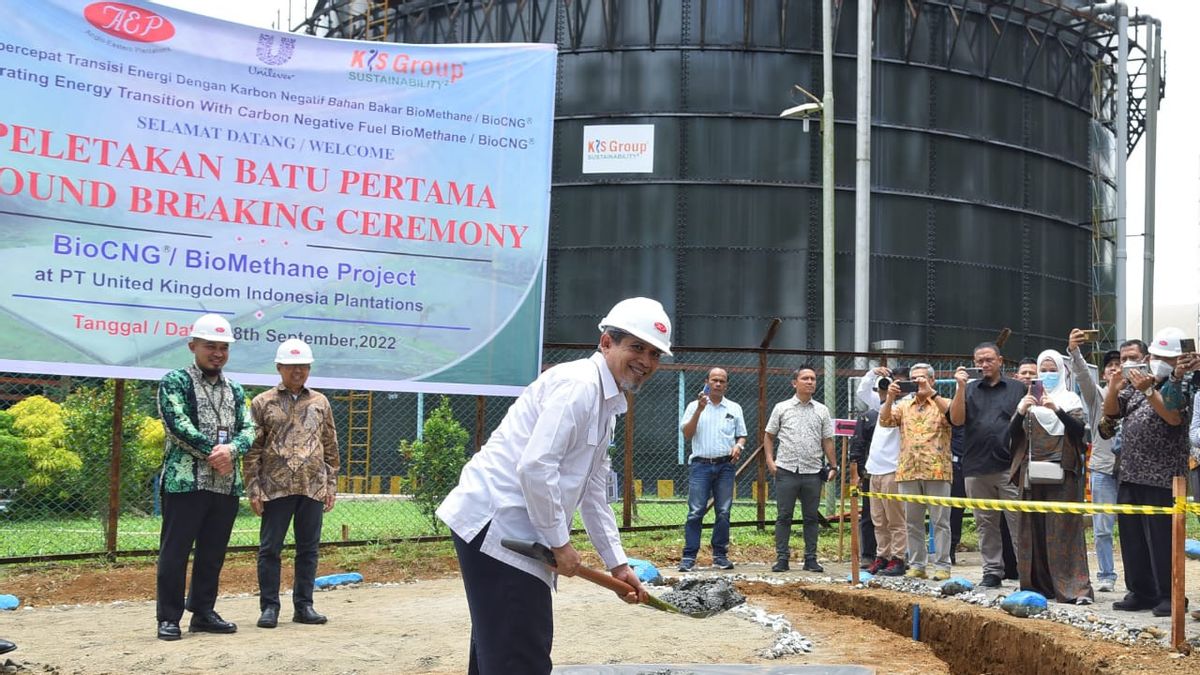JAKARTA - PT. United Kingdom Indonesia Plantation together with possible PLC Plantations and PT Unilever started the BioCNG Factory construction project.
Pada tahap I direncanakan akan dibangun sebanyak 25 (twenty five) Factory Bio-CNG masing-masing dengan kapasitas 15.500 M3 BioCNG/hari, dengan total 387,000 M3 BioCNG, yang diperkirakan akan menghasilkan pengurangan 3,7 juta ton Co2 per tahun dan menghasilkan 3,7 juta kredit karbon per tahun.
The Director of Bioenergy, Directorate General of New Energy, Renewable and Energy Conservation (EBTKE), Ministry of Energy and Mineral Resources (ESDM), Edi Wibowo appreciated the efforts made by PT KIS Group, which has contributed significantly to supporting the energy transition in Indonesia, especially in the context of utilizing new and renewable energy (EBT) as an energy source.
"The construction of the Bio-CNG project is expected to be one of the good efforts of the KIS Group in participating in the success of the program to increase the use of EBT in the national energy mix," said Edi Wibowo in an official statement, Thursday, September 29.
Edi also appreciated the Bio-CNG Plant development project that will be carried out by the KIS Group.
"We hope that the start of the project, which is marked by today's ground breaking ceremony, which coincides with the National Mining and Energy Anniversary with the tagline Energy Rises Stronger, will run smoothly and make a significant contribution in supporting the energy transition in Indonesia, and encourage the acceleration of achieving the target of the renewable energy mix by 23 percent by 2025 and Net Zero Emission by 2060 or sooner," continued Edi.
Edi revealed, one of the stakeholders who has taken into account the development of industrial-scale biogas is KIS Group, where PT KIS Indonesia has built more than 20 Biogas factories in Indonesia since 2012 with success, and is at the forefront of industrial-scale biogas development.
Through the collaboration between PT KIS Indonesia and evidence Plantations and PT. Unilever Oleochemical Indonesia, KIS Group developed its first large-scale Bio-CNG/Bio-Methane commercial project in Indonesia and Asia, to replace fossil fuels.
This form of cooperation is realized and marked by the laying of the first stone (groundbreaking ceremony).
The construction of the Bio-CNG plant phase I is targeted for commissioning from April to November 2023. All three projects will generate BioCNG volume of 1,230 MMBtu/day, with an investment value of around 15 million US dollars.
"We appreciate the group's KIS efforts to increase the use of industrial-scale biogas, which targets that by December 2024, it will complete 25 factories, with a total investment value of 110 million US dollars, and will reduce carbon emissions by 3.7 million tons of CO2/year which will create green jobs for the surrounding community which then provide a multiplier effect for better and more sustainable economic development," said Edi.
Chief Executive Officer (CEO) of PT KIS Group KR badminton said KIS Group is a leader in Biogas and Bio-CNG fields in Indonesia and Asia. The laying of the first stone for this project marks the start of a major energy transition and decarbonization.
"We will carry out the commissioning of the first three projects, in collaboration with the AEP Group and the Crown Group in April 2023 to November 2023 with Bio-CNG volume reaching 1,230 MMBtu/day. KIS has signed a contract for a long time with PTPN, Ok IV AEP Group, Mahkota Group, and other groups to supply organic waste," explained motorists.
Unilever Oleochemical Indonesia will buy this Bio-Compressed Natural Gas (CNG) to replace fossil fuels in order to accelerate the achievement of the Net Zero Emission target.
PT Unilever will be the first in Asia/Indonesia to use Bio-CNG to replace fossil fuels on a large scale.
"KIS Group has signed a long-term contract with Unilever and other parties to supply Bio-CNG. By December 2024, KIS Group will complete 25 factories, these projects will also create jobs on a large scale," explained left.
The development of Bio-CNG projects in the palm oil industry will help oil plantations/factories reduce carbon emissions, overcome waste problems and help nearby industries to better utilize EBT as an effort to reduce dependence on fossil fuels and decarbonization.
In addition, this step in developing and building the BioCNG project will certainly help create green job opportunities for the surrounding community which then provides a multiplier effect for better and more sustainable economic development.
The English, Chinese, Japanese, Arabic, and French versions are automatically generated by the AI. So there may still be inaccuracies in translating, please always see Indonesian as our main language. (system supported by DigitalSiber.id)








